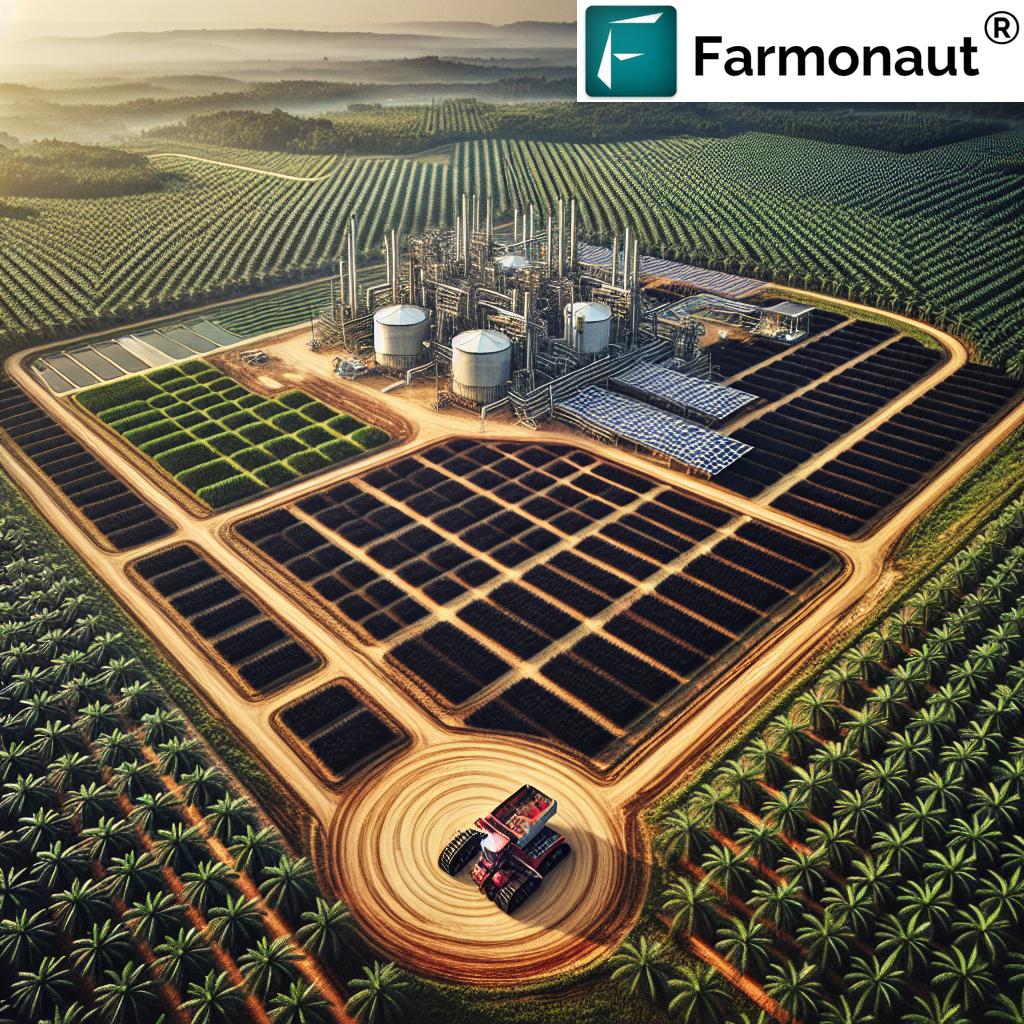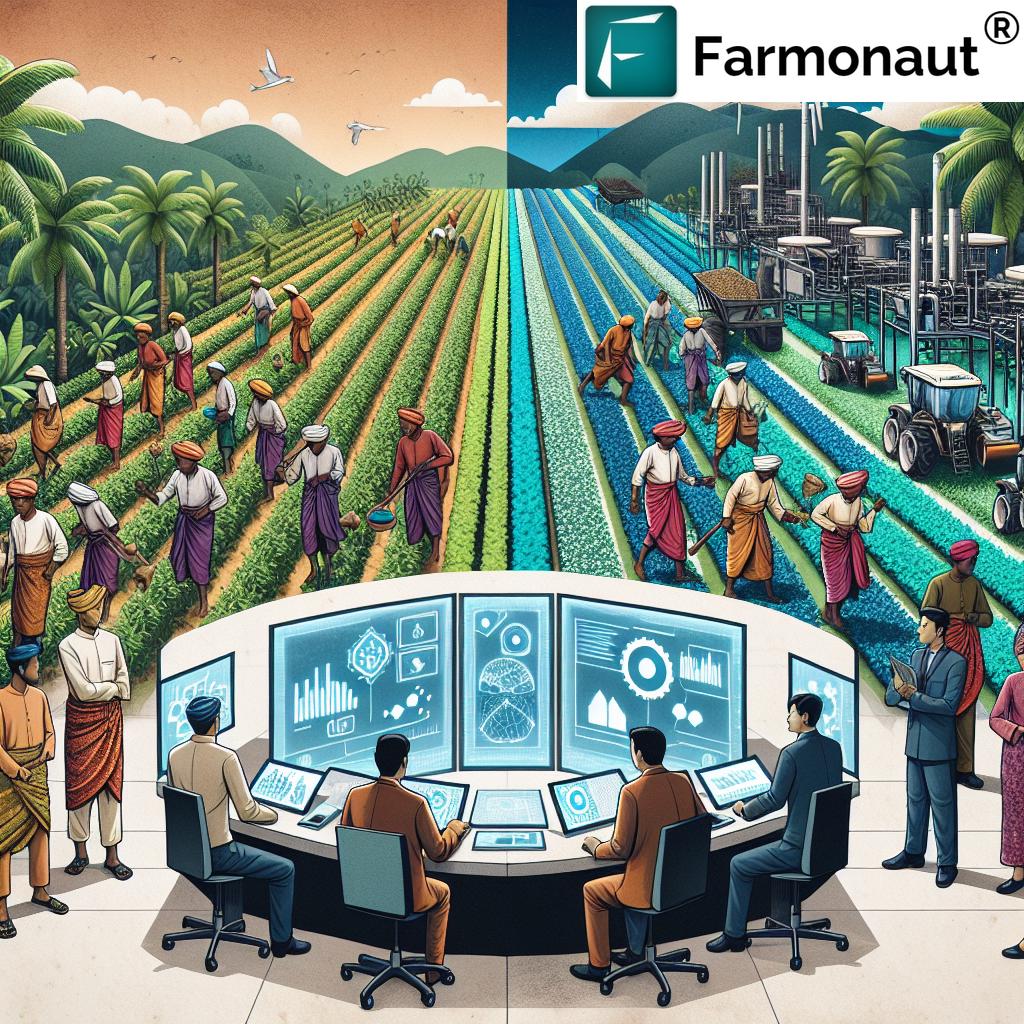Revolutionizing Agricultural Operations: Sustainable Plantation Management in Indonesia and Malaysia
“Southeast Asia’s palm oil industry is undergoing a major shift, with 70% of plantations adopting sustainable practices in 2023.”
In the ever-evolving landscape of agricultural operations in Southeast Asia, we are witnessing a profound transformation in plantation management across Indonesia and Malaysia. This shift represents more than just a change in leadership; it heralds a new era for sustainable palm oil production and tropical crop management. As we delve into this transition, we’ll explore how it’s reshaping the future of agriculture in the region and its implications for the global market.
The Changing Face of Agribusiness Leadership
The recent announcement from Anglo-Eastern Plantations Plc, a prominent agricultural company operating in Indonesia and Malaysia, exemplifies the ongoing transition in the sector. The retirement of Executive Director Dato’ John Lim Ewe Chuan, effective December 31, 2024, marks the end of an era and the beginning of a new chapter in the company’s history.
This agribusiness leadership transition is not unique to Anglo-Eastern but reflects a broader trend across the industry. As veteran leaders step down, a new generation of executives is stepping up, bringing fresh perspectives and innovative approaches to plantation management in Indonesia and Malaysia.

Embracing Sustainable Palm Oil Production
One of the most significant shifts we’re observing is the increased focus on sustainable palm oil production. Both Indonesia and Malaysia, being the world’s largest producers of palm oil, are at the forefront of this change. The industry is moving away from practices that have been criticized for their environmental impact, embracing more sustainable methods that prioritize conservation and long-term viability.
- Implementation of no-deforestation policies
- Adoption of integrated pest management techniques
- Investment in research for higher-yielding, disease-resistant palm varieties
- Development of waste-to-energy systems in palm oil mills
These initiatives are not just environmentally responsible; they’re also proving to be economically beneficial in the long run. Companies like Anglo-Eastern are recognizing that sustainability is key to maintaining their competitive edge in the global market.
Advancements in Agricultural Technology in Malaysia
“Agricultural technology advancements have increased plantation efficiency in Malaysia by 25% over the past five years.”
The rapid advancement of agricultural technology in Malaysia is playing a crucial role in transforming plantation operations. We’re seeing a surge in the adoption of innovative technologies that are revolutionizing every aspect of plantation management:
- Precision agriculture using satellite imagery and drones
- IoT sensors for real-time monitoring of soil and crop conditions
- AI-powered predictive analytics for yield forecasting
- Blockchain technology for supply chain transparency
These technological advancements are not just improving efficiency; they’re also enabling more sustainable practices by optimizing resource use and reducing waste.
In this context, companies like Farmonaut are at the forefront of the agricultural technology revolution. Farmonaut offers advanced, satellite-based farm management solutions that are making precision agriculture more accessible and affordable for farmers across the region. Through its Android, iOS, and web applications, as well as its API, Farmonaut is empowering plantation managers with real-time insights and data-driven decision-making tools.
Explore Farmonaut’s solutions:
Evolving Tropical Crop Management Practices
The transformation we’re witnessing isn’t limited to palm oil. Tropical crop management across the board is undergoing significant changes. From rubber to cocoa, plantation managers are adopting more sophisticated and sustainable approaches:
- Diversification of crop portfolios to mitigate risks
- Implementation of agroforestry systems
- Adoption of organic farming practices
- Use of bio-fertilizers and natural pest control methods
These practices not only improve the resilience of plantations but also contribute to biodiversity conservation and soil health improvement.

The Role of Agricultural Corporate Governance
The shift we’re observing in agricultural corporate governance is a critical factor driving these changes. Companies listed on international exchanges, like Anglo-Eastern on the London Stock Exchange, are under increasing pressure from investors and regulators to adopt more sustainable and transparent practices.
Key aspects of this governance shift include:
- Enhanced environmental, social, and governance (ESG) reporting
- Implementation of sustainable sourcing policies
- Greater transparency in supply chain management
- Increased investment in community development programs
These changes in corporate governance are not just about compliance; they’re about creating long-term value and ensuring the sustainability of the industry.
Plantation Efficiency Optimization: A Data-Driven Approach
Plantation efficiency optimization has become a key focus area for companies operating in Indonesia and Malaysia. The integration of big data analytics and AI is transforming how plantations are managed:
- Predictive maintenance of equipment to reduce downtime
- Optimization of harvesting schedules based on real-time data
- Automated irrigation systems that respond to weather forecasts and soil moisture levels
- Data-driven workforce management to improve productivity
These optimization efforts are not just about increasing yields; they’re about making the entire operation more sustainable and resilient.
For plantation managers looking to leverage advanced data analytics, Farmonaut’s API offers a powerful solution. It provides access to satellite imagery and weather data that can be integrated into existing management systems, enabling more informed decision-making.
Explore Farmonaut’s API:
Farmonaut API
API Developer Docs
Agritech Innovations Reshaping Southeast Asia’s Agricultural Landscape
The wave of agritech innovations in Southeast Asia is transforming the agricultural sector at an unprecedented pace. From vertical farming in urban areas to drone-based crop spraying in vast plantations, technology is addressing long-standing challenges and opening up new possibilities:
- Development of climate-resilient crop varieties through genetic engineering
- Use of robotics for precision harvesting
- Implementation of smart irrigation systems
- Adoption of vertical farming techniques in urban areas
These innovations are not just improving productivity; they’re also making agriculture more sustainable and accessible, even in challenging environments.
Sustainable Plantation Practices: A New Standard
The adoption of sustainable plantation practices is rapidly becoming the new norm in Indonesia and Malaysia. These practices go beyond environmental considerations to encompass social and economic sustainability:
- Implementation of zero-waste policies in plantation operations
- Development of circular economy models within plantations
- Adoption of fair labor practices and community engagement programs
- Investment in renewable energy sources for plantation operations
Companies that are leading in sustainable practices are finding that they’re not just benefiting the environment and local communities; they’re also gaining a competitive edge in the global market.
The Impact on Global Agricultural Markets
The changes we’re witnessing in plantation management in Indonesia and Malaysia are having far-reaching effects on global agricultural markets. As two of the world’s largest producers of palm oil and other tropical crops, the shift towards sustainability and efficiency in these countries is influencing global supply chains and market dynamics:
- Increasing demand for certified sustainable palm oil
- Growing preference for traceable and ethically sourced agricultural products
- Shift in global trade patterns as sustainable practices become a competitive advantage
- Influence on international policy-making regarding agricultural sustainability
These changes are not just reshaping the industry in Southeast Asia; they’re setting new standards for agricultural operations worldwide.
Challenges and Opportunities Ahead
While the transformation of plantation management in Indonesia and Malaysia presents numerous opportunities, it also comes with its share of challenges:
- High initial costs of implementing new technologies and sustainable practices
- Need for skill development and training of the workforce
- Balancing productivity increases with environmental conservation
- Navigating complex regulatory environments across different countries
However, these challenges also present opportunities for innovation, collaboration, and growth. Companies that can successfully navigate these changes will be well-positioned to lead the industry into a more sustainable and prosperous future.
The Role of Technology in Sustainable Plantation Management
Technology is playing a pivotal role in enabling and accelerating the transition to sustainable plantation management. Solutions like those offered by Farmonaut are making it easier for plantation managers to implement data-driven, sustainable practices:
- Real-time crop health monitoring using satellite imagery
- AI-powered advisory systems for optimized resource management
- Blockchain-based traceability solutions for supply chain transparency
- Carbon footprint tracking to support sustainability initiatives
These technological solutions are not just improving efficiency; they’re also providing the data and insights needed to make more sustainable decisions.
Comparative Analysis: Traditional vs. Sustainable Approaches
To better understand the transformation taking place in plantation management, let’s compare traditional approaches with the new sustainable methods being adopted:
| Management Aspect | Traditional Approach | Sustainable Approach |
|---|---|---|
| Crop Diversity | Monoculture (80% adoption) | Diversified cropping (40% adoption, increasing) |
| Water Management | Flood irrigation (70% usage) | Precision irrigation (50% adoption) |
| Soil Conservation | Chemical fertilizers (90% usage) | Organic and bio-fertilizers (30% adoption) |
| Pest Control | Chemical pesticides (85% usage) | Integrated Pest Management (45% adoption) |
| Technology Integration | Limited use (20% adoption) | Extensive use of AgriTech (60% adoption, rapidly increasing) |
This shift towards sustainable practices is not just a trend; it’s becoming the new standard in plantation management across Indonesia and Malaysia.
The Future of Plantation Management in Southeast Asia
As we look to the future, it’s clear that the transformation of plantation management in Indonesia and Malaysia is just beginning. We anticipate several key trends to shape the industry in the coming years:
- Increased adoption of AI and machine learning for predictive agriculture
- Greater integration of IoT devices for real-time monitoring and management
- Development of climate-resilient farming practices
- Expansion of regenerative agriculture techniques
- Growing emphasis on biodiversity conservation within plantation landscapes
These trends will continue to drive innovation and sustainability in the sector, ensuring that plantation agriculture in Southeast Asia remains competitive and responsible on the global stage.
Conclusion: A New Era for Sustainable Agriculture
The transformation we’re witnessing in plantation management across Indonesia and Malaysia marks the beginning of a new era for sustainable agriculture in Southeast Asia. From leadership transitions to technological innovations, every aspect of the industry is evolving to meet the challenges of the 21st century.
As companies like Anglo-Eastern Plantations Plc adapt to these changes, and technology providers like Farmonaut continue to innovate, we’re seeing the emergence of a more sustainable, efficient, and responsible agricultural sector. This transformation is not just about preserving the environment or increasing profits; it’s about ensuring the long-term viability of an industry that plays a crucial role in the global economy and food security.
The journey towards fully sustainable plantation management is ongoing, but the progress made in recent years is encouraging. As we move forward, collaboration between industry leaders, technology innovators, policymakers, and local communities will be key to realizing the full potential of sustainable agriculture in Southeast Asia.
FAQs
- What is driving the shift towards sustainable plantation management in Indonesia and Malaysia?
The shift is driven by a combination of factors including environmental concerns, market demands for sustainable products, regulatory pressures, and the recognition that sustainable practices can improve long-term profitability and resilience. - How is technology transforming plantation management in Southeast Asia?
Technology is enabling precision agriculture through satellite imaging, IoT sensors, AI-driven analytics, and blockchain for supply chain transparency. These innovations are improving efficiency, reducing resource use, and enabling data-driven decision-making. - What are some key sustainable practices being adopted in palm oil production?
Key practices include no-deforestation policies, integrated pest management, waste-to-energy systems, and the development of high-yield, disease-resistant palm varieties. - How are agribusiness leadership transitions influencing plantation management?
New leaders are bringing fresh perspectives and a stronger focus on sustainability and technology integration, driving the adoption of innovative practices and corporate governance models. - What role does agricultural corporate governance play in sustainable plantation management?
Corporate governance is crucial in implementing sustainable practices, ensuring transparency, and aligning operations with ESG (Environmental, Social, and Governance) principles, which are increasingly important to investors and stakeholders.






